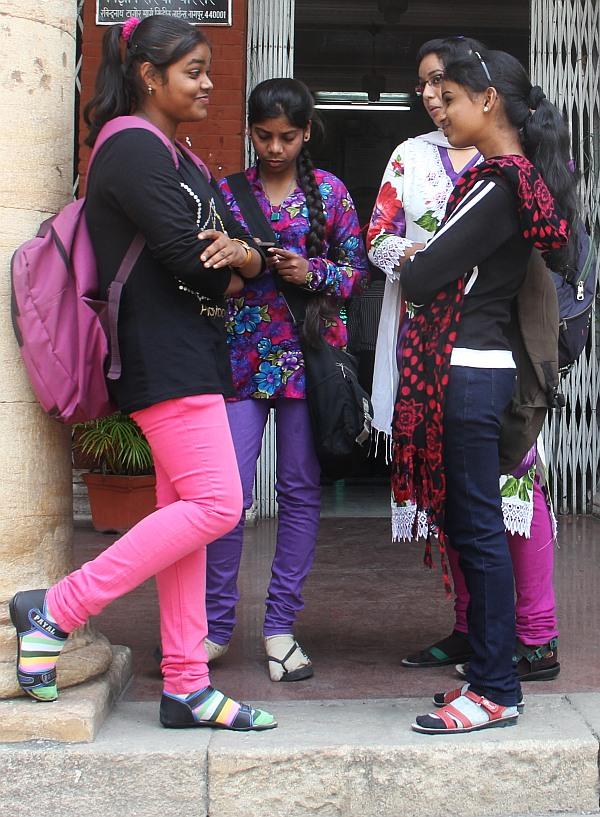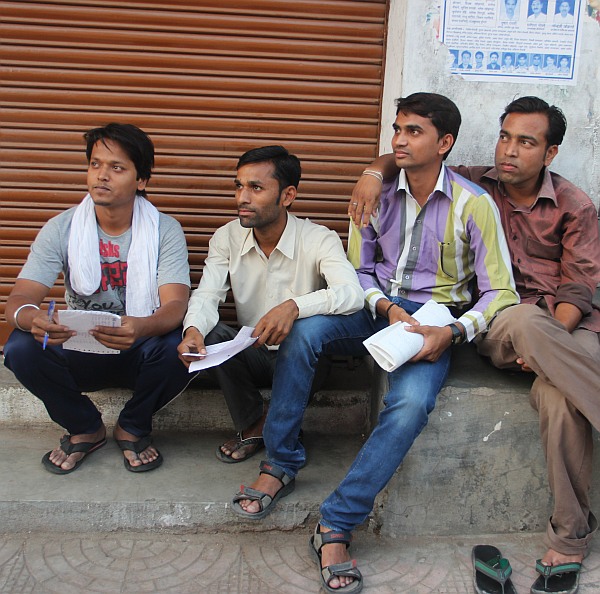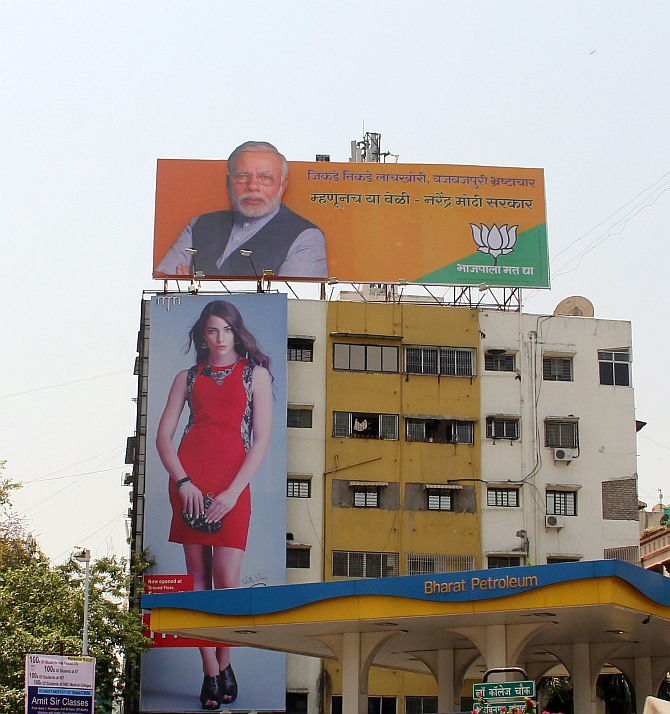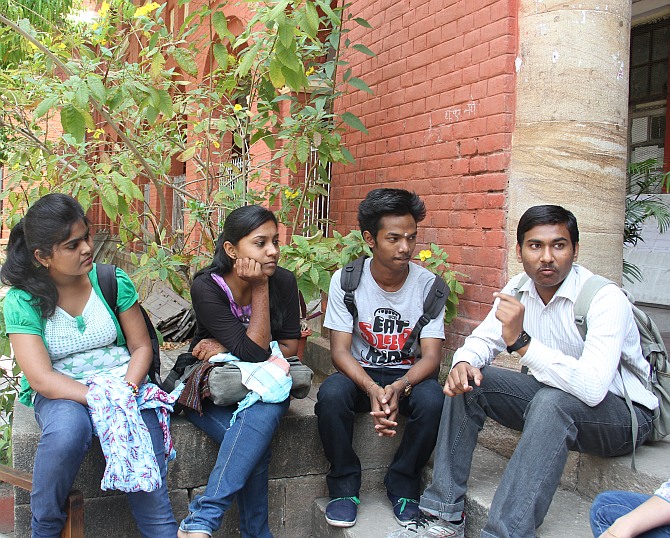
'I would like to vote for Kejriwal. He is an aam aadmi like us. He has good middle class values. Corruption is the most important issue of this election. I don't like Modi because of his past.'
Rediff.com's Vaihayasi Pande Daniel and photographer Uttam Ghosh travel to Nagpur, Maharashtra's third most populous city, to assess the mood among young voters.
Nagpur is a young city.
Nearly 50 per cent of the city's population is below age 15 (Census 2011). And a much larger number is below 25.
Youngsters appear empowered and educated. Capable too. Young women and men, trendily-dressed, move around freely on motorcycles or bicycles.
Malls and restaurants are manned by mainly youth. It's election season -- most political campaigns have legions of young folk helping out.
These youngsters are outspoken, and more importantly, unlike disinterested young adults elsewhere, have views:
"Kejriwal is an aam aadmi like us. He has good middle class values..."
"Modi will bring development..."
Nagpur is also a university town with over 200 colleges and institutes, including India's only National Fire Service College.
The city has high literacy -- 93 percent as per the last Census.
Both Aam Aadmi Party chief Arvind Kejriwal and the Bharatiya Janata Party's prime ministerial candidate Narendra Modi have caught the imagination of the young in the city.
Kejriwal, perhaps more so. Youngsters' eyes light up when they speak about him, his courage and his campaign to bring change. The AAP leader seems to instantly connect or speak to a section of Indian youth, who were voiceless and unrepresented, politically, before.
Also read: The Japanese monk who is against the BJP
Kindly ...

Should one wander into Muslim areas or Dalit neighbourhoods, even if youngsters -- newly-minted voters or second-time voters -- do not finally vote for the AAP, they find Arvind Kejriwal especially intriguing.
Sushant Kathane works at the cavernous Central Mall, which is mostly empty on a Monday night, located not far from Nagpur's Deekshabhoomi, where Dr B R Ambedkar converted to Buddhism in 1956.
"I would like to vote for Kejriwal. He is an aam aadmi like us. He has good middle class values. Corruption is the most important issue of this election. I don't like Modi because of his past."
A key issue for Nagpur youngsters, Sushant says, is the lack of jobs. "There are not enough jobs in Nagpur. One has to go to Pune to find work."
Vishal Tarikar and Mohammed Anees, who work in a tiny roadside cloth stall in Nagpur's largest Muslim area, Mominpara, want to vote for Independent candidate Javed Anees, who is attached to the Democratic Socialist Party.
The reason? Anees owns the shop they are employed in.
Vishal and Anees both voted for the Congress's Vilas Muttemwar in the 2009 election and predict that the Bharatiya Janata Party's Nitin Gadkari has a good chance of winning this time because he has done good work in Nagpur.
Mohammed Shahid and Mohammed Imran Ansari, who run hat and scarf stalls respectively, will vote Congress.
"The party kept the peace around here all these years," they say, adding that Nagpur has never had riots and Hindus and Muslims live in harmony. Muttemwar and his party also organised for Muslims to go for the Haj directly from Nagpur.
Kindly ...

"I will vote for Modi," says Anand Bhagde who works at a Cafe Coffee Day outlet in south Nagpur. "He has brought change," though Anand is not sure what change Narendra Modi has brought. He says he will vote for the BJP because that is the party his family will vote for.
Aatish Gaur, who did his MA in mathematics from the Indian Institute of Science and has joined the institute as a lecturer, does not have a voting card.
But he has read somewhere that if you go to the booth on polling day, with the right documentation, a card can be rustled up on the spot.
If that works out, then his vote is for Modi. "We have had Congress. Why not Modi now?"
Pankaj Pawar works at the Central Mall and is all for Modi.
He likes the work the Gujarat chief minister has done in his home state.
"I have been to Gujarat and seen the development, he says, narrating how he travelled to Anand, the home of the Amul milk cooperative, and to Gandhinagar, the state capital. He has seen development, the roads, the townships and is considerably impressed.
Modi, Pawar says, can create employment in the country. Everyone needs jobs in Nagpur. "I have seen the number of applications that come in for jobs here."
Kindly ...

Four youngsters sit on the steps of the Indian Institute of Science. They are studying statistics and are in their first year at the institute, working towards a bachelor's degree.
Piyush Waghmare, Priyanka Gajbhiye, Shubham Chapekar and Rajaswita Kengale believe Election 2014 is different from earlier elections.
The differentiator? Arvind Kejriwal's arrival on the political scene.
They were in class when his March 13 road show went past the institute and they caught a glimpse of the AAP leader.
Priyanka feels Kejriwal is an honest man. She even finds him good looking. She thinks he is doing a good job cleaning up the system. Piyush and Shubham agree with her.
Rajaswita on the other hand will vote Congress. "The BJP talks big, but the reality is quite different," she says.
If AAP got too many votes she thinks it would split the Congress vote and bring Modi to power.
None of these youngsters want Modi to come to power, because of his record on communalism.
All four believe corruption is by far the most insurmountable problem confronting the country today, though they have only rarely encountered it themselves.
Unemployment is another important issue at stake in this election. And communalism.
They are full of awed admiration for what Kejriwal has achieved in a year.
Politics is an arena where ordinary people do not dream of entering and Kejriwal has proved that it is accessible to people just like them.
He has made entry into politics look easy, they explain. Not only has he been able to make inroads, he has brought change too. That so many poke fun of what Kejriwal is attempting to do is natural, they feel.
When someone is trying to do something new, they say "he is seen as foolish."
"He should be given a chance," the youngsters say. Arvind Kejriwal's imagination to think about change is enough for him to deserve their votes.